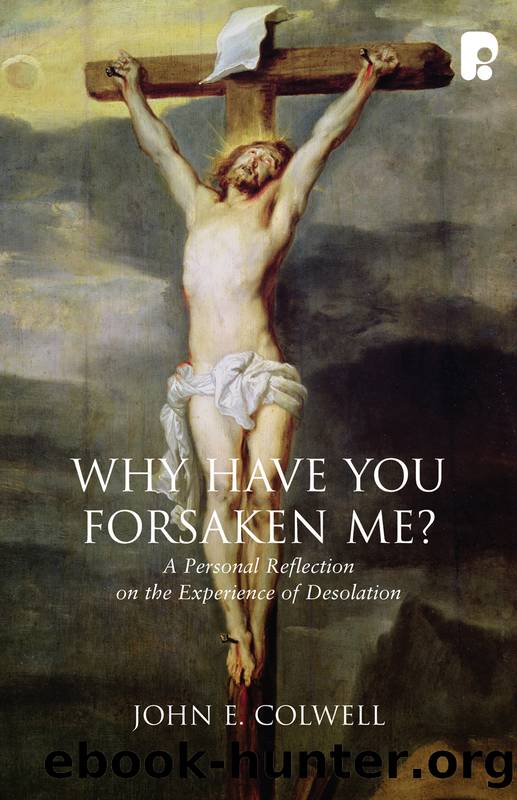Why Have You Forsaken Me? by Colwell John E.;

Author:Colwell, John E.;
Language: eng
Format: epub
Publisher: Authentic Media
Chapter Six
Christâs Unique Darkness
From the sixth hour until the ninth hour darkness came over all the land.
About the ninth hour Jesus cried out in a loud voice, âEloi, Eloi,1 lama sabachthani?ââwhich means, âMy God, my God, why have you forsaken me?â
When some of those standing there heard this, they said, âHeâs calling Elijah.â
Immediately one of them ran and got a sponge. He filled it with wine vinegar, put it on a stick, and offered it to Jesus to drink. The rest said, âNow leave him alone. Letâs see if Elijah comes to save him.â
And when Jesus had cried out again in a loud voice, he gave up his spirit.
At that moment the curtain of the temple was torn in two from top to bottom. The earth shook and the rocks split. The tombs broke open and the bodies of many holy people who had died were raised to life. They came out of the tombs, and after Jesusâ resurrection they went into the holy city and appeared to many people.
When the centurion and those with him who were guarding Jesus saw the earthquake and all that had happened, they were terrified, and exclaimed, âSurely he was the Son2 of God!â.
(Matthew 27:45â54)
All human suffering is unique and particular: though others may suffer the same illnesses, the same pain, the same abuse, the same rejection, they suffer uniquely as the unique people that they are. But all human suffering is human: notwithstanding its particularity and uniqueness, there is an underlying commonality and continuity. The suffering of Christ, like all human suffering, was particular and unique, but it was the concern of the last chapter to argue, nonetheless, that his suffering was truly human suffering, common and continuous with all human suffering. Yet, Christâs suffering was uniquely and particularly his and the precise nature of that particularity, I suspect, has issued in a further basis for removing his suffering from the continuity of our suffering, his cry of abandonment from our apparently similar cries. Part of the horror of so much human suffering is its apparent meaninglessness, its random pointlessness. Certainly virtues of fortitude, patience, hopefulness can be developed and matured through the experience of suffering â but generally in those who are virtuous in the first place and such secondary outcomes hardly justify suffering or render the meaningless meaningful. But Christâs suffering was purposeful with quite specific meaning and outcome, â⦠the Son of Man did not come to be served, but to serve, and to give his life as a ransom for manyâ (Matthew 20:28; cf. Mark 10:45), and the recognition of this purposefulness tends to specify our hearing of his cry of abandonment and to render it again remote.
I suspect that it is almost impossible for contemporary Western Christians, or indeed any Western Christians since the Reformation, both Catholic and Protestant, to hear Christâs cry of dereliction other than as a quite specific and unique event of forsakenness: on the Cross the sinless Son of God is made sin for
Download
This site does not store any files on its server. We only index and link to content provided by other sites. Please contact the content providers to delete copyright contents if any and email us, we'll remove relevant links or contents immediately.
The 5 Love Languages: The Secret to Love That Lasts by Gary Chapman(9815)
The Space Between by Michelle L. Teichman(6942)
Assassin’s Fate by Robin Hobb(6223)
Wiseguy by Nicholas Pileggi(5787)
Everything Happens for a Reason by Kate Bowler(4743)
Gerald's Game by Stephen King(4654)
Pillow Thoughts by Courtney Peppernell(4284)
A Simplified Life by Emily Ley(4163)
The Power of Positive Thinking by Norman Vincent Peale(4065)
Harry Potter and the Prisoner of Azkaban (Book 3) by J. K. Rowling(3360)
Resisting Happiness by Matthew Kelly(3341)
Girl, Wash Your Face by Rachel Hollis(3282)
Being Aware of Being Aware by Rupert Spira(3277)
The Secret Power of Speaking God's Word by Joyce Meyer(3222)
The Code Book by Simon Singh(3189)
More Language of Letting Go: 366 New Daily Meditations by Melody Beattie(3030)
Real Sex by Lauren F. Winner(3023)
Name Book, The: Over 10,000 Names--Their Meanings, Origins, and Spiritual Significance by Astoria Dorothy(2987)
The Holy Spirit by Billy Graham(2953)
